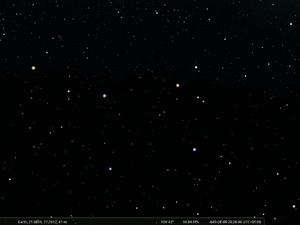Uttara Bhadrapada: Difference between revisions
From All Skies Encyclopaedia
Uttara Bhadrapada
No edit summary |
|||
| Line 6: | Line 6: | ||
==Etymology and History== |
==Etymology and History== |
||
=== Origin of Constellation === |
=== Origin of Constellation === |
||
Uttara Bhadrapada literally means "the second of the blessed feet". Together with Purva Bhadrapada, the first of the blessed feet, it forms a super-constellation. Yet, in temples the two asterisms with similar names are depicted in totally different ways. This one is drawn as a |
Uttara Bhadrapada literally means "the second of the blessed feet". Together with Purva Bhadrapada, the first of the blessed feet, it forms a super-constellation. Yet, in temples the two asterisms with similar names are depicted in totally different ways. This one is drawn as a anthropomorphic figure with two faces who holds the two stars in their hands. The two stars are likely to be identified with γ Pegasi and α Andromedae. |
||
=== Transfer and Transformation of the Constellation === |
=== Transfer and Transformation of the Constellation === |
||
Revision as of 10:14, 9 August 2025
... is an Indian name, used by the Indian Vedic tradition. Most of these names are roughly 3000 years old. They pre-date Hinduism but were taken over by it.
Etymology and History
Origin of Constellation
Uttara Bhadrapada literally means "the second of the blessed feet". Together with Purva Bhadrapada, the first of the blessed feet, it forms a super-constellation. Yet, in temples the two asterisms with similar names are depicted in totally different ways. This one is drawn as a anthropomorphic figure with two faces who holds the two stars in their hands. The two stars are likely to be identified with γ Pegasi and α Andromedae.
Transfer and Transformation of the Constellation
Mythology
mnemonic tales and cultural significance
Weblinks
References
- References (general)






